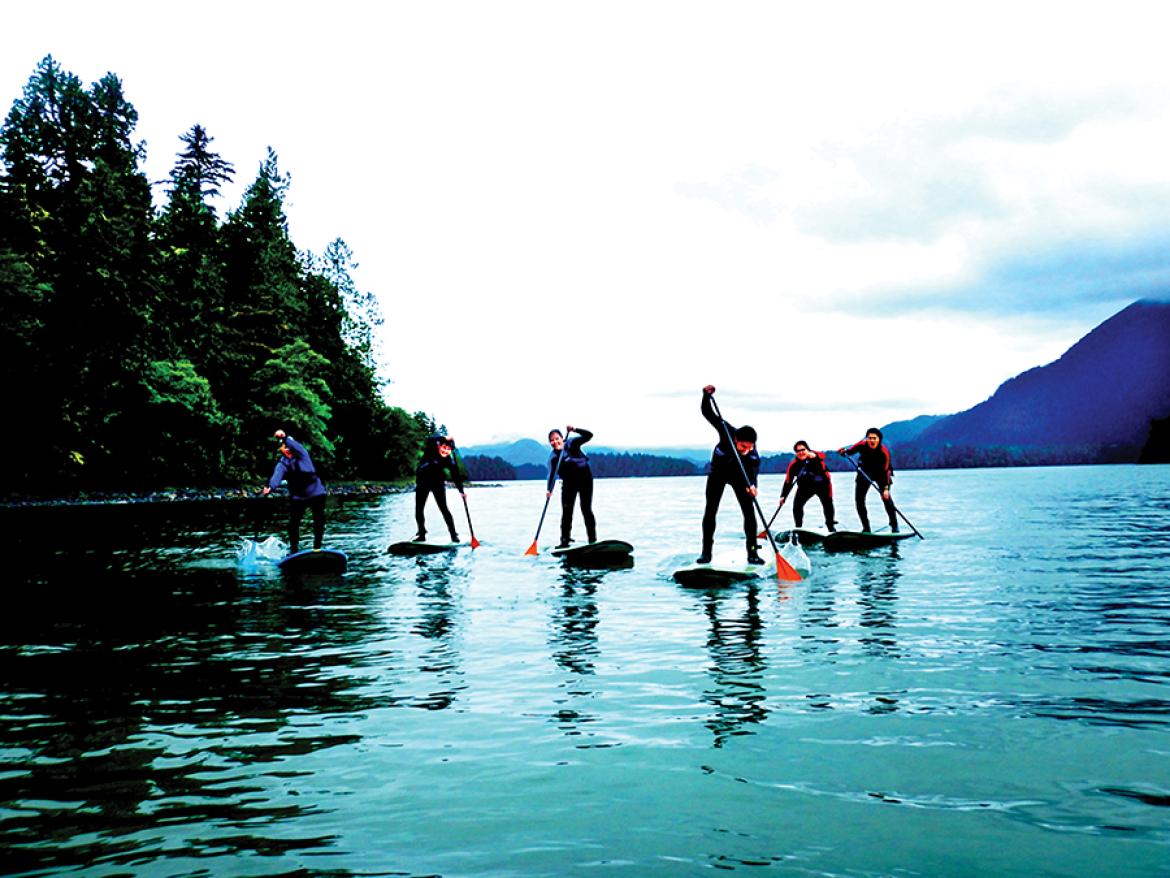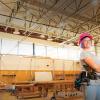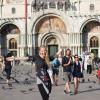
The Aboriginal Ecotourism Training Program is a unique, community-based program offered at VIU in partnership with Heiltsuk Tribal Council and North Island College that combines technical skills needed for the tourism industry with cultural teachings and Indigenous world views. Image courtesy of T'ashii Paddle School.
January 4, 2017 - 11:00am
Vancouver Island University partners with Heiltsuk Tribal Council and North Island College to offer a unique, innovative, community-based Aboriginal Ecotourism Training Program that aims to improve learning outcomes for First Nations students.
By Jenn McGarrigle
Sometimes, learning takes place better outside. Take Vancouver Island University’s (VIU’s) Aboriginal Ecotourism Training Program, a joint venture between VIU, North Island College and Heiltsuk Tribal Council in Bella Bella, for example.
This innovative program provides relevant, hands-on training to First Nations students in communities that are successfully operating Aboriginal ecotourism businesses already. Once finished, students have experienced ecotourism for themselves and are more prepared to start these types of businesses in their own communities, supporting not only themselves and their families, but also improving the economic outlook of their First Nation.
The program, funded by a Ministry of Advanced Education grant, is delivered in a unique, community-based format where students travel to different regions participating in ecotourism activities once a month for seven months. This gives them the opportunity to learn about the industry and experience a variety of different ecotourism activities that these communities are involved in, giving students some insight into what might work in their own communities. They also complete a two-month internship with a tourism-focused business. The model allows students to return to their home communities in between sessions, which are about 6-10 days in duration.
While “in class,” students visit with local Elders as well as tourism operators. This is the unique part of the program, as it bridges the technical skills aspects with local knowledge and Indigenous world views in what Frank Brown, the program’s Indigenous Heritage and Ecotourism Advisor from Heiltsuk Nation, calls “a powerful formula for a unique and transformative experience.”
“By combining Elders teachings and cultural learnings with technical training we have a better chance of empowering our Indigenous students,” says Pam Botterill, VIU’s Aboriginal Outreach Coordinator. “Through this approach, our students are able to see how the skills they are learning fit within their culture and within their Nation. They see that these skills are relevant to their Indigenous ways of knowing and being and this has encouraged students to blossom and become much more engaged in their learning. I don’t think anyone else is doing anything like it.”
Many of the students are from remote areas and have not had a chance to travel or experience ecotourism businesses before, says Botterill. “We take them to areas where tourism is happening,” she says. “Many of these students would never have had an opportunity to do these types of activities before, and it’s hard to open an ecotourism business if you’ve never experienced it. It’s critical that the learning is taking place in the places ecotourism is happening — it would not have the impact or success rate it does if these students came to campus to learn in a traditional classroom setting.”
For Kathy Brown, the program’s Community Coordinator from Heiltsuk Nation, the program affirms students’ life experiences as well as introduces them to university-level education. The program targets students from undereducated, underemployed backgrounds, ensuring students who traditionally have not accessed any form of post-secondary education are reached.
“It introduces university courses to young people who always dreamt of going to university,” she says. “There’s a disconnect between First Nations communities and post-secondary institutions — many Indigenous students don’t feel welcome or comfortable in that environment as they don’t see themselves or their culture reflected there. The link between the two for this program is myself and Frank, and how we collaborate on the field delivery of the program with approaches that inspire and support Indigenous learners.”
Dr. Sharon Hobenshield, VIU’s Director of Aboriginal Education, said the program’s success is based on its unique partnerships, where community and the University share their traditions and teachings collectively. “It is this reciprocal exchange that makes the program work — the students learn from VIU; and VIU learns from the students and the community as to what type of approaches to learning will best support the students and in turn their Nation,” she says. “Everyone is learning and gaining knowledge and experience. This is what reconciliation looks like.”
Students complete 13 courses throughout the nine-month program, which include offerings from both VIU and NIC as well as industry credentials, including First Host, Wilderness First Aid, Restricted Operator for VHF Radio Operations and Paddle Canada certifications. Upon completion, students receive VIU’s Certificate in Adventure Tourism and Recreation. They will also have completed about 65 per cent of the requirements for NIC’s Adventure Guiding Certificate.
The Student Experience
From a six-hour kayak trip to an island near Tofino, to a stroll along the Alert Bay waterfront, to enjoying a spectacular sunset on a Quadra Island beach, Jeannine Adams-Charleson is experiencing the natural beauty of Vancouver Island in a way she never had the chance to before.
More importantly, the program is driving Adams-Charleson, the community health representative for Hesquiaht First Nation, which is near Tofino on the West Coast of Vancouver Island, to change her life and the lives of those around her. By experiencing the natural beauty of other parts of the Island and trying out various ecotourism activities, she has a renewed sense of pride in what her own community has to offer and a better understanding of the importance of recreational activities in supporting healthy lifestyles.
This new understanding spurred her to seek grant money to buy standup paddleboards and a kayak for her community, and she also organized some wellness days and grief and loss workshops.
“This program has pushed me to do more things for my community, my people and my family,” says Adams-Charleson. Her goal is to one day open her own tourism business with her husband in Hot Springs Cove, offering water taxi and whale watching services.
“To access funds, we’ll need experience and education,” says Adams-Charleson. “The program will help me with both.”
Evangeline Clifton finds the program effective because they talk about different aspects of the tourism industry in a classroom setting, then experience it for themselves and talk to those running these types of businesses.
Clifton, from Heiltsuk Nation, relocated to Nanaimo two years ago to take advantage of increased opportunities for her children. Her experiences in the ecotourism program have helped her see that further education is a viable option for her. After her summer internship with Tourism Nanaimo, Clifton started a Bachelor of Tourism Management degree in September, with the end goal of helping to further progress the tourism industry in Bella Bella.
“I see the economic benefits of ecotourism and where [Heiltsuk Nation] is located on the coast, it’s just an amazing place for it,” she says. “We need jobs up there and while there is a tourism industry there already, it just isn’t developed in a way that contributes to the community as a whole.”
Ecotourism Outlook
Dave Pinel, Ccoordinator of the Adventure Guiding Programs in NIC’s Tourism and Hospitality Department, and co-owner of West Coast Expeditions, an Aboriginal ecotourism business, says there are plenty of job opportunities for program graduates.
“There’s a growing desire to see tourism develop and a strong demand for Aboriginal tourism products in particular,” he says. “There’s more demand for Aboriginal people to work in the sector than there are people ready for that work.”
Rob Ferguson, a VIU Recreation and Tourism instructor, believes the program will successfully prepare students for work in this field because it immerses them in both the cultural and technical skills aspects of the industry, and helps them build connections.
”The experience is from breakfast to bedtime,” he says. “Every conversation is meaningful; every interaction is relevant. And the fact that they’re spending all this time together means we’re creating a network of emerging professionals because they’re making connections with each other through this experience.”
The provincial government has provided funding for two deliveries of the certificate program. VIU and partners are exploring ways to continue the program, and perhaps take it elsewhere in the province, says Botterill. “It’s clear this model is having a deep and real impact on these students which will in turn impact their ability to create economic opportunities for themselves and their communities.” For more details, contact Botterill at pam.botterill@viu.ca.
Sidebar: Roots of the Aboriginal Ecotourism Training Program: A Timeline
The Aboriginal Ecotourism Training Program was made possible by a history of partnerships and collaborations between Vancouver Island University (VIU), Heiltsuk Tribal Council (HTC) and North Island College (NIC).
January 2010 – VIU signs a partnership agreement with NIC that includes increased collaborative programming, seamless transfer arrangements and greater opportunities for collaborative research initiatives and faculty professional development.
August 2011 – A protocol agreement is signed between VIU and HTC.
Spring 2013 – HTC asks VIU to run a community-based Event Management Certificate program in their community. The First Nation was preparing to receive more than 5,000 Tribal Journey visitors to the small community of Bella Bella.
Summer 2014 – VIU participates in the Tribal Journey 2014 event, paddling from Nanaimo to Bella Bella.
Fall 2014 – Funding is made available for a pilot version of the Aboriginal Ecotourism Training Program, which the three partners ran together in 2014.
March 2015 – The Ministry of Advanced Education announces funding for community-based programs for Aboriginal students. The three partners teamed up again to propose the full certificate program.
January 2016 – The first 14 students from 10 different First Nations on the Island and West Coast start the program. They travelled to seven communities – Quadra Island, Nanaimo, Courtenay, Alert Bay, Tofino/Ucluelet, Cowichan and Powell River.
*This article originally appeared in the Fall/Winter 2016 issue of VIU Magazine. Check out more stories from the latest issue of VIU Magazine here.
Tags: VIU Magazine






